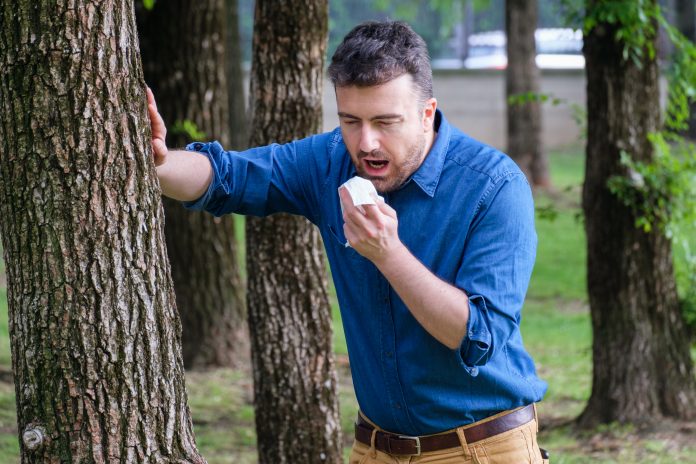Rather than just waiting for your hay fever symptoms to arrive then treating them with medicines, airborne allergens expert, Max Wiseberg, recommends a more holistic and natural approach to the problem
From the food we eat, to the air we breathe and our lifestyle choices – they can all have a profound effect on our hay fever symptoms, here are some simple ideas.
One of the best ways to treat hay fever is to avoid allergens in the first place. Staying indoors when pollen counts are highest, keeping our homes free from pollen and using an organic allergen barrier balm can all help stop pollen getting in our bodies before they can cause a reaction. Less pollen, less sneezing!
Limit exposure during peak hours
Limit your exposure to pollen during the peak morning and evening periods. Pollen is released early in the morning, then travels upwards as the air warms up. In the evening, as the air cools, it moves back down again and the pollen grains reach nose height. Symptoms are usually worst at these times, so avoid going outdoors then.
Allergy balm
Apply an organic allergen barrier balm around the rim of the nostrils and bones of the eyes before venturing outdoors. Independent studies have shown that it traps over a third of the pollen before it gets into the body [1]. Wearing a cap or hat will prevent pollen being trapped in your hair and wraparound sunglasses will help protect the eyes.
Close windows and doors
Keep doors and windows closed during the day and night to keep pollen out of the house and use an air conditioner preferably with a HEPA (High Efficiency Particle Arresting) filter to capture the pollen particles. Vacuum carpets and floors regularly, as well as beds, curtains and other fabrics, to remove pollen particles. It’s also beneficial to damp dust surfaces daily, to remove pollen; damp dusting prevents pollen being redistributed into the air.
Change your diet
A healthy diet can also help with hay fever. Eating healthily helps to keep our respiratory system strong. Some foods such as ginger or fresh basil, ease blocked nasal passages, helping us to breathe more easily, whilst others such as spinach and almonds contain nutrients that can help boost our immune systems and help our bodies fight sinus and respiratory infections, which are linked to allergies and hay fever.
A Mediterranean diet is recommended as it is high in antioxidants which are immune-boosting. A study published in the journal Thorax found that Crete islanders who ate a Mediterranean diet had fewer allergy-related symptoms. They noted that diet staples such as nuts, grapes, oranges, apples and fresh tomatoes were protective against wheezing and nasal allergy symptoms [2].
Get better sleep
Sleep long and well. Quite a lot of life’s problems seem somewhat less problematic after a good night’s sleep, and it’s just one of the things that can really help treat your hay fever symptoms. An NPARU* study showed that people who slept at least 7 hours a night suffered significantly milder symptoms than those who slept no more than 5 hours each night.
When you suffer from hay fever, your sleep often suffers too, with sneezing, itchiness and runny nose keeping you awake. So it becomes a vicious circle. You get less sleep, which makes your hay fever worse, so you sleep less, and so on; there seems no escape. However, following a regular bedtime routine can help. Take a shower or bath before bed. This will wash away pollen collected in your hair during the day, as well as relax you. Apply an organic allergen barrier balm around the rim of the nostrils and bones of the eyes immediately after washing or showering, and keep a pot by your bed for the night for when needed.
Wash bedding regularly
Ensure that you wash bedding very regularly to remove allergens. Frequent washing, covering the bed with a sheet which is carefully folded and stored away from the bed during the night, before you get into bed, and turning pillows just before you get in, can all help reduce symptoms. And make sure you dry bedding indoors, as outdoor drying on a clothes line can mean the wind blows pollen on to them! And if you own a pet such as a cat or dog, ensure that you keep it out of your bedroom, as pollen particles will collect in its fur and be dispersed into the room.
Reduce your alcohol intake
Drink responsibly. Reduce the amount of alcohol you drink. Beer, wine and spirits all contain histamine, the chemical that sets off allergy symptoms in your body. In addition to making you more sensitive to pollen, alcohol also dehydrates you, making your symptoms seem worse.
Increase exercise
Exercise. You should try to do two and a half hours of moderate-intensity aerobic exercise every week. Moderate-intensity means fast walking, cycling, water aerobics, pushing a lawnmower; that sort of thing. Obviously you should avoid exercising outdoors when the pollen count is highest.
Reference
[1] Chief Investigator: Professor Roy Kennedy, Principal Investigator: Louise Robertson, Researcher: Dr Mary Lewis, National Pollen and Aerobiology Research Unit, 1st February 2012.
[2] https://thorax.bmj.com/content/62/8/677











